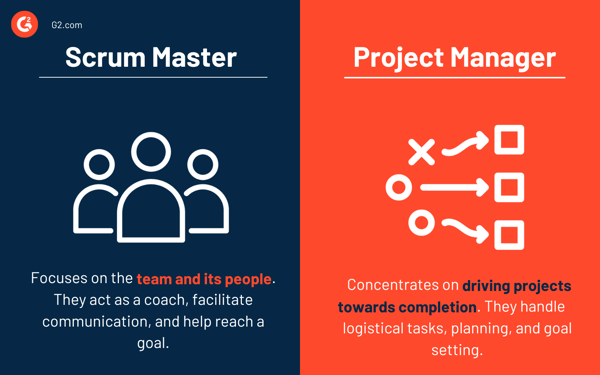What is a scrum master?
A scrum master facilitates scrums, an agile project management methodology. The scrum master ensures that all participants complete tasks correctly within a one-to-four-week project sprint.
Several types of teams follow the agile framework, and most of them use the scrum methodology. Scrum masters have a variety of roles within a team, including the coach, mediator, and administrator.
Scrum masters may use project management software to manage agile sprints and track task completion. These tools keep teams organized and allow for better collaboration.
Responsibilities of a scrum master
Since scrum masters work with different types of teams, their exact tasks vary. However, all scrum masters must keep a group functioning efficiently by managing the following responsibilities.
- Coaching team members: A strong scrum master provides opportunities and resources that help team members improve their skills and capabilities. With proper coaching, collaborators can achieve better growth in the work environment.
- Facilitating meetings: Scrum teams participate in four different types of meetings: sprint planning to set goals and determine tasks, daily standups to share progress overviews quickly, sprint reviews to discuss accomplishments at the end of a project, and retrospectives to reflect on how to improve for the next sprint. The scrum master serves as a facilitator or mediator during all four meetings.
- Removing obstacles: Scrum masters remove impediments or obstacles that might prevent the scrum from progressing efficiently. For example, if the team is waiting on approval from a stakeholder, the scrum master will encourage the stakeholder to respond faster. The scrum master works to minimize or eliminate any systemic roadblocks so team members can focus on moving toward the goal.
- Fostering communication: Scrum masters listen to stakeholders and team members and ask thoughtful questions to understand their issues. They also moderate discussions among workers and help resolve any conflicts that arise.
Benefits of a scrum master
The scrum master is an invaluable asset, helping the scrum run smoothly and achieve desired outcomes. An effective scrum master helps a team stay accountable for its success and achieve maximum efficiency. The presence of a competent scrum master can:
- Improve collaboration skills. Since one of their primary responsibilities is to streamline communication on the team, a scrum master can help employees better their teamwork skills.
- Maintain agile values. Some companies commit to following agile project management, but then lose focus and fall away from agile principles and values. A scrum master promotes the five scrum values: courage, commitment, respect, focus, and openness. They also ensure that workers adhere to the three scrum pillars: transparency, adaptation, and inspection.
- Reduce time to market. Scrum masters keep the team on track in sprints to help shorten products’ time to market. Since scrum masters mediate retrospectives, they’re periodically allowing the team to reflect and determine ways to improve in the next sprint to save even more time.
Scrum master best practices
Becoming a proficient scrum master takes time and effort. To excel in the role, a scrum master must:
- Build a strong team. Scrum masters have to empower each team member to reach their full potential. Team members should be confident enough to make important decisions and independent enough to solve problems as they arise without always turning to the scrum master. At the same time, the scrum master ought to encourage the team to work collaboratively and cohesively. If processes aren’t running smoothly, the scrum master has to facilitate team-building activities.
- Prioritize scrum ceremonies. When a team is busy, their scrum ceremonies, essential meetings during key points in a sprint, can fall to the bottom of the priority list. Scrum masters should hold space for these events to keep all stakeholders and team members in the loop. The ceremonies are also a time to reflect on wins and challenges.
- Collect feedback. A good leader always tries to improve. A scrum master should conduct surveys to receive feedback on their communication style, support skills, and facilitation capabilities.
- Seek professional development and certifications. Many courses are available for scrum masters looking to refine their skills. Although a scrum master isn’t required to achieve professional certification, it can help them build their capacity and stand out on job applications.
Scrum master vs. project manager
Scrum masters and project managers both guide a project, but beyond that, the two positions differ considerably.

A scrum master focuses on the team and its people. They coach team members, facilitate communication, and ensure nothing stands in the way of their goals. Scrum masters only exist within the agile methodology called scrum.
A project manager mainly concentrates on driving projects toward completion. They often handle logistical tasks, planning, delegating, and goal setting in a leadership capacity. Businesses that use project managers are typically centered on traditional project management.
If the scrum methodology isn’t the right fit for your company, discover the waterfall methodology for project management.
 by Kelly Fiorini
by Kelly Fiorini
 by Kelly Fiorini
by Kelly Fiorini
 by Kelly Fiorini
by Kelly Fiorini